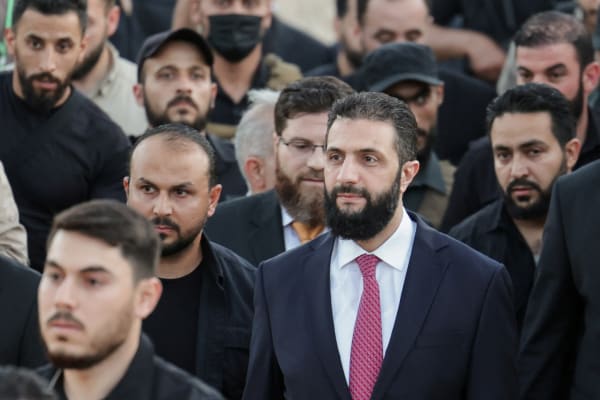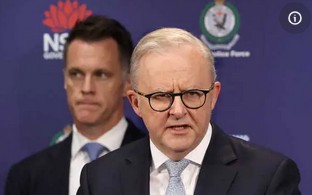Syria’s interim President Ahmed al-Sharaa attends the “Aleppo, Key to Victory” celebration marking Syria’s liberation, in Aleppo, Syria, May 27, 2025. REUTERS/Khalil Ashawi
In a rare face-to-face meeting, Syrian Foreign Minister Asaad al-Shaibani and Israel’s Strategic Affairs Minister Ron Dermer on Tuesday discussed de-escalating the tensions between their countries and the possibility of reinstating the 1974 ceasefire agreement.
Over the past decades, direct meetings between officials from Israel and Syria have been exceedingly rare.
However, the Paris meeting marked the second encounter this month between Shaibani and Dermer, as the U.S. seeks to broker a deal that would legitimize the new Syrian government, still heavily dominated by former Islamist terrorists.
Syria’s state-run SANA news agency confirmed that a meeting took place, without providing details. However, a senior Trump administration official told the Associated Press, “The U.S. continues to support any efforts that will bring lasting stability and peace between Israel and its neighbors.”
This, the U.S. official said, follows President Donald Trump’s “vision of a prosperous Middle East” that includes a “stable Syria at peace with itself and its neighbors – including Israel.”
“We want to do everything we can to help achieve that,” he added.
The meeting followed a preparatory meeting in Jordan last week, where U.S. envoy to Syria, Tom Barrack, met with Shaibani as well as Jordan’s foreign minister, Ayman al-Safadi.
Jordan rejected Israel’s request to send humanitarian aid to the Druze community in southern Syria through its territory. According to Axios, the U.S. then attempted to broker an agreement for a humanitarian corridor inside Syria to allow the aid transfer.
The relationship between Syria’s new government and Israel has already seen quite a few ups and downs since the collapse of the Assad regime in December 2024.
After initially voicing strong opposition to the new regime, Israel entered covert negotiations under U.S. pressure. However, following the attack on the Syrian Druze, Israel launched dozens of airstrikes against regime forces and even on targets in the capital, Damascus , which angered the U.S.
A government source told the al-Ekhbariya news outlet, which is aligned with Syria’s new regime, that in Tuesday’s meeting, “both sides reaffirmed their commitment to Syria’s territorial unity and rejected any plan aimed at dividing it.”
“They emphasized that al‑Suwayda remains an integral part of Syria and that the Druze citizens are an essential part of the national fabric.”
The sides reportedly also discussed how to establish a mechanism to reactivate the 1974 ceasefire agreement, “which would ensure a halt to Israeli incursions into Syrian territory and bring about a more stable environment.”
After the collapse of the Assad regime and its army, which had upheld the Syrian side of the agreement, Israel ordered the IDF to take over the former demilitarized zone between the countries and turn it into a buffer zone. In addition, the IDF occupied the strategic peak of Mt. Hermon.
The source added that both sides committed to working on reducing tensions in southern Syria and preventing the region from descending into open conflict.
Today I had a warm and informative meeting with Israeli Druze spiritual leader Sheikh Muwaffaq Tarif and his team. We discussed the situation in Suwayda and how to bring together the interests of all parties, de-escalate tensions, and build understanding. pic.twitter.com/A7htbbSl2r
— Ambassador Tom Barrack (@USAMBTurkiye) August 19, 2025
Ahead of Tuesday’s meeting, Barrack and Dermer met with Sheikh Mowafaq Tarif, the spiritual leader of Israel’s Druze community, whose members include families with ties to the Druze in Syria.
“We discussed the situation in Suwayda and how to bring together the interests of all parties, de-escalate tensions, and build understanding,” Barrack wrote on 𝕏.
According to Ynet News, the two leaders also spoke about the possibility of creating a humanitarian corridor from the Israeli border to the Druze village of Hader – on the Syrian Golan Heights – and, from there, to the Druze city of Suwaydah, which lies to the southeast.
The move could serve as a confidence-building measure with the Syrian regime.





